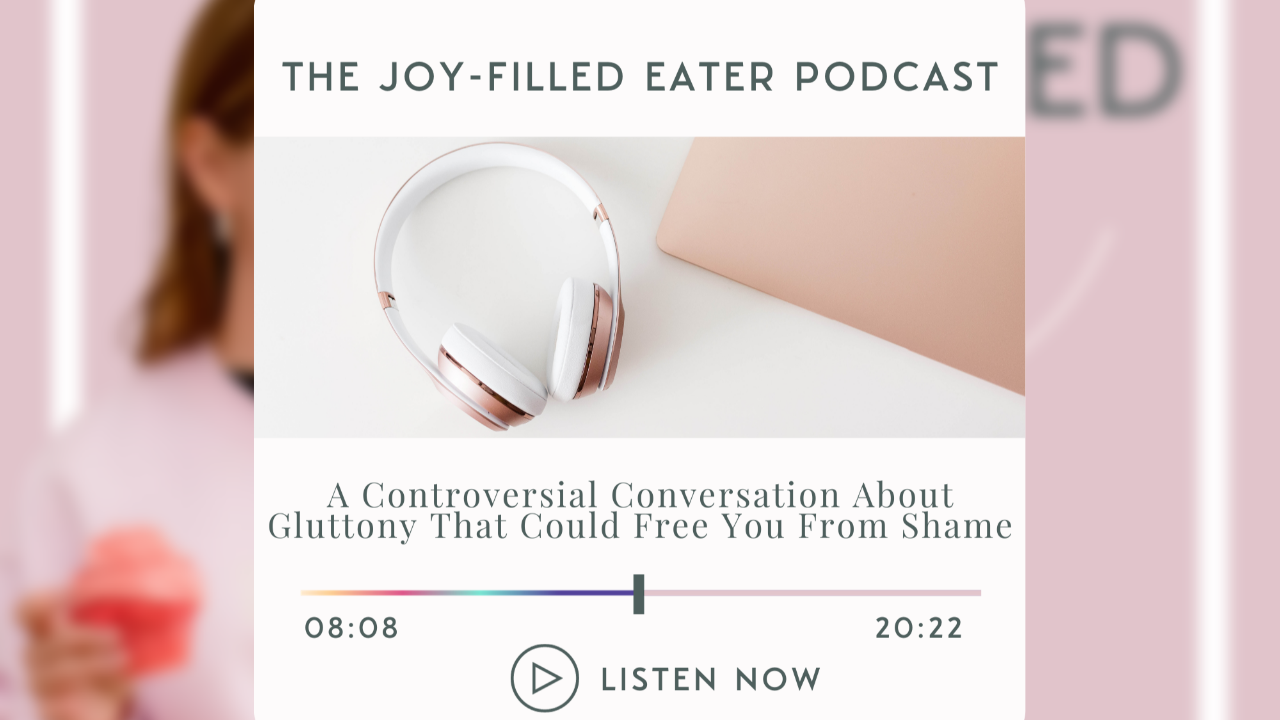A Controversial Conversation About Gluttony That Could Free You From Shame

Hey there, food freedom seeker! Welcome to the very first episode of The Joy-Filled Eater Podcast. I'm Brittany Braswell, your food freedom and body image coach, and we're about to dive into a topic that's been a bit hush-hush: Gluttony. We're here to spill the beans and debunk some common misconceptions, so stick around.
Misconceptions About Gluttony
You've probably heard some doozies about gluttony, like "You should eat to live, not live to eat" or "Gluttony is one of the 7 deadly sins" (which, by the way, isn't even in the Bible). And let's not forget the classic, "You should just have more self-control and willpower." But guess what? Those shame-inducing comments don't solve squat when it comes to your relationship with food.
Let me drop a truth bomb 💣. Gluttony isn't just about scarfing down too much grub. There's a myriad reasons why someone might eat a large amount of food or feel like they've lost control around certain foods. Take 'Sharon', for instance. She's been battling binge eating since the days of recess and lunchables. Her family's rigid food rules turned her into a secret snacker, sneaking into the kitchen when no one was looking.
Sharon's Struggles
As an adult, Sharon's body started morphing, and well-meaning folks started doling out compliments. But those kind words fueled the fire of her disordered eating, and her quest for the "perfect" body left her stressed, depressed, and more isolated than ever.
The Gluttony vs. Disordered Eating Showdown
Let's set the record straight on gluttony vs. disordered eating. Gluttony isn't just about how much you chow down; it's about the intentions and motivations behind the food frenzy. To decode this, we're going back to the original Hebrew texts.
Unraveling the Hebrew Origins
In the Old Testament, gluttony isn't a buffet brawl—it's all about heart posture. The Hebrew word "zalal" basically means being a 'wasteful, vile, or lavish squanderer'. It's more about your attitude than what's on your plate.
Proverbs on Point
Proverbs 28:7 and 23:19-21 back this up, urging us to avoid vile behaviors that waste what we've got, not just when it comes to food, but in life.
Why You Feel Food FOMO
If you've ever felt like food controls you, it might not be gluttony. There are 4 common culprits:
- Physical restriction: Not eating enough or avoiding certain noms
- Mental restriction: Telling yourself certain foods are "bad" or off-limits (and guess what, that just makes you crave them more)
- Losing touch with your body's hunger and fullness cues
- Using food to meet unmet needs.
Time to Take Action
Now that we've served up some truth, it's your turn to take a bite. Here's what you can do:
- Check out The Needs Assessment to uncover the root reasons behind why you engage in certain disordered or unhealthy behaviors having to do with food or your body.
- Reflect on your results and bring them in prayer to the Lord.
- Consider seeking support from a professional or diving into some self education & accountability. (You can do that RIGHT HERE inside The Joy-Filled Eater course!)
- Join the Food Freedom & Body Image Support for Christian Women Facebook group to find your people if you know you need a community who just gets it.
Thanks for joining our feast of knowledge on gluttony and food freedom. Snap a screenshot of the show for your Insta stories and tag me to share your biggest takeaway. Until next time friend, may you be filled with joy and abound in hope.

Subscribe to Faith-Filled Food Freedom
If you found this blog helpful, be sure to subscribe to the Faith-Filled Food Freedom podcast for more Christ-centered food freedom & body image support every Tuesday & Thursday!





